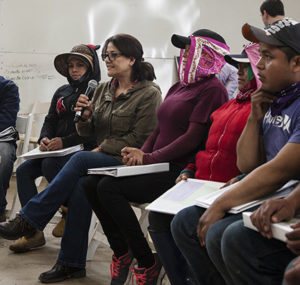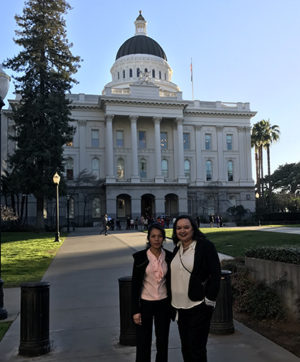EFI’s Worker-Management Collaboration Teams Work to End Harassment on Farms
“You are not alone” is the mantra of the #MeToo movement that began in 2006 with Tarana Burke, who sought to help survivors of sexual violence—particularly young women of color from low-income communities—find pathways to healing. Ironically, the movement didn’t go viral until Hollywood became its voice in 2017, when more than 80 women made sexual abuse allegations against American film producer Harvey Weinstein.
In a matter of weeks, the movement’s hashtag began to generate a national conversation about sexual violence. But #MeToo is not just for Hollywood. Its reach includes many women in everyday walks of life, and it highlights the risk of those who are most vulnerable to workplace exploitation, including women who may be undocumented and working in solitary or isolated places.

Approximately 700,000 women work in relative obscurity in agricultural fields and packing sheds across the United States. Victoria Breckwich, with the University of Washington’s Pacific Northwest Agricultural Safety and Health Center, estimates that 70 to 80 percent of female agricultural workers experience some type of sexual harassment within the industry in their lifetime, along with about 10 percent of male workers. And unlike in Hollywood, the stories of agricultural workers receive much less attention from the media.
Women farmworkers rely on their jobs to meet basic needs and care for their families. Not all of them speak English, and for those whose primary language is indigenous, it is even harder to access useful information to get help. Perpetrators commonly prey on the women’s immigration status and fear of deportation to victimize them.
In the lead-up to the Take Back the Workplace March in Los Angeles on November 12, 2017, the Alianza Nacional de Campesinas, an association of women farmworkers, submitted a signed letter of solidarity with the women of Hollywood.
The letter appeared in Time magazine and affirmed:
“We wish that we could say we’re shocked to learn that this is such a pervasive problem in your industry. Sadly, we’re not surprised because it’s a reality we know far too well.”
“We also carry shame and fear resulting from this violence. It sits on our backs like oppressive weights. But, deep in our hearts we know that it is not our fault. The only people at fault are the individuals who choose to abuse their power to harass, threaten and harm us, like they have harmed you.”
Mónica Ramírez, co-founder of Alianza Nacional de Campesinas, comes from a family of farmworkers. She noted that “the history of agriculture in the U.S. has always been one of sexual violence—on farms, conditions are ripe for it.” In 2013, the PBS show Frontline partnered with Univision to shine a bright light on sexual violence against women farmworkers through a report called Rape in the Fields.
Peter O’Driscoll, Executive Director of Equitable Food Initiative (EFI) points out that “agriculture is no more immune to this scourge than any other sector of the economy. And due to the prevalence of undocumented workers in the fields, and the fact that farmworkers have fewer legal protections than other categories of employee, women who experience sexual harassment in the produce industry are that much less likely to report it.”
EFI Works to Foster a Respectful, Harassment-Free Environment
“When you know better, you do better,” said author and activist Maya Anjelou, and that’s a good place to start for EFI. Our training and certification is helping to tackle harassment and many other issues on farms by ensuring that farmworkers are treated fairly and experience a safer and healthier work environment. As preeminent scholar on sexual harassment Louise Fitzgerald points out, decades worth of research show that when a company clearly communicates that sexual harassment is not tolerated, it is less likely to occur.
The EFI Program fosters a culture of collaboration and respect on farms, and has been found to be a successful model for eliminating sexual harassment and improving the work environment for women and minority workers. A study by Getz and Strochlic cites EFI’s success in improving workplace culture around gender equity by providing opportunities for women to have a voice without fear of retaliation.
 In February 2018, Barbara Resendiz and Jackie Vazquez from Andrew & Williamson Fresh Produce testified before the California State Senate during a joint hearing of the Committee on Judiciary and The Select Committee on Women, Work & Families. “Working on an EFI farm, women feel more secure and able to communicate any problem that would occur,” stated Resendiz, a farmworker. “They have a voice to speak up. People coming from more rural areas in Mexico and other indigenous workers are able to lose their fear and know that they can report things and there is a method in place to address any issue. You feel safe because you know there is going to be no retaliation against reporting an issue.”
In February 2018, Barbara Resendiz and Jackie Vazquez from Andrew & Williamson Fresh Produce testified before the California State Senate during a joint hearing of the Committee on Judiciary and The Select Committee on Women, Work & Families. “Working on an EFI farm, women feel more secure and able to communicate any problem that would occur,” stated Resendiz, a farmworker. “They have a voice to speak up. People coming from more rural areas in Mexico and other indigenous workers are able to lose their fear and know that they can report things and there is a method in place to address any issue. You feel safe because you know there is going to be no retaliation against reporting an issue.”
Farm manager Jackie Vazquez stated, “The EFI Leadership Team helps each small crew resolve its conflicts, and they have the tools to either efficiently resolve them or know when it has to be elevated to higher management. This has been a game changer for us. … In the realm of sexual harassment, we enforce a no-tolerance policy, and our employees through the EFI team and continued training know that we mean it. They come not just to accept it, but to value that change.”
Two fundamental capacities that result from the EFI training and active Leadership Team participation are active listening and empathy. These abilities are driving profound shifts on farms as management styles evolve and perspectives are shared and respected. Members of EFI Leadership Teams also cite these skills and capacities as improving their family and community relationships beyond the workplace.
Employees deserve to expect a safe and harassment-free workplace. In an era of challenging labor issues in agriculture, farms cannot afford to overlook female workers. Women make up 50 percent of the population but are often less than 30 percent of the farm labor workforce. EFI-certified companies are reporting increases in the recruitment and retention of women thanks to new policies that not only promote their well-being and safety but also give them tools to succeed and advance in the organization.
As Resendiz noted about EFI during her testimony to the Senate committees, “It’s a forum to feel more secure, to know what your value is and to feel respected in the workplace and enforce that value with everyone else.”
For more information on how to create a workplace culture that eliminates harassment, visit equitablefood.org.

